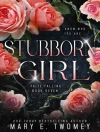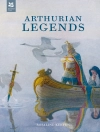In ‘The Legend of the Bleeding-heart, ‘ Annie F. Johnston weaves a poignant narrative that encapsulates themes of love, loss, and cultural heritage within a richly detailed landscape. Set against the backdrop of the early 20th century, Johnston’s prose is characterized by a lyrical quality that draws on folklore and myth, evoking the depth of human emotion interwoven with local lore. The story artfully explores the connection between the natural world and human experience, creating a tapestry of interconnected tales that reflect both personal and collective memory, inviting readers to ponder the significance of legacy in shaping identity. Annie F. Johnston, an influential figure in children’s literature during her time, was deeply inspired by her own experiences growing up amid the natural beauty and intricate traditions of her native homeland. Her works often mirror her affinity for storytelling and her desire to preserve the oral histories of her community, giving voice to characters that resonate with both authenticity and vibrancy. Johnston’s literary journey reflects her commitment to fostering appreciation for the cultural narratives that enrich our understanding of the past. This captivating tale is recommended for readers who enjoy richly woven narratives that celebrate cultural heritage while navigating the realms of love and memory. ‘The Legend of the Bleeding-heart’ provides an insightful exploration of the human condition that will not only resonate with young readers but also inspire adults seeking deeper connections to their own histories.
About the author
Annie Fellows Johnston (1863-1931) was an American author known for her sentimental tales and children’s literature which resonated with the values of her time. Born in Mc Cutchanville, Indiana, Johnston was raised in a family that highly valued education and storytelling. Her literary career began to flourish after moving to Pewee Valley, Kentucky, the setting that inspired much of her work. ‘The Legend of the Bleeding-heart’ is one of her noteworthy creations, a novel that explores themes of love, sacrifice, and the symbolic significance of the bleeding-heart flower. Johnston’s prose often carried a didactic quality, characteristic of the era’s literature aimed at young audiences. Her other renowned series, ‘The Little Colonel’ books, gained massive popularity for its depiction of Southern life and the adventures of its charming protagonist, Lloyd Sherman, also known as the Little Colonel. Johnston’s work has been celebrated for its vivid characterizations and the moral lessons it imparts, continuing to provide a nostalgic glimpse into turn-of-the-century Americana. Despite the evolution of literary tastes, Johnston’s stories remain a testament to the enduring nature of wholesome storytelling and its ability to impart life lessons to successive generations.












